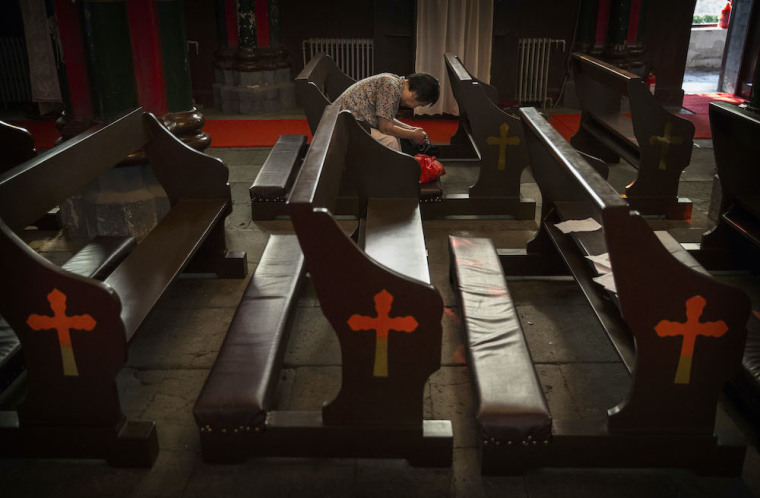
The prospect that China’s Christian community might reach a staggering 300 million people by 2030 has unnerved communist leaders who fear “they’ll have to share power” as the Church increases in size and influence, according to Open Doors’ Ron Boyd-MacMillan.
Boyd-MacMillan, director of Strategic Research at Christian charity Open Doors, told the Express UK that the Chinese Communist Party, led by President Xi Jinping, is becoming increasingly concerned about the Christian population’s growth and is cracking down on religion as a result.
“We think the evidence as to why the Chinese Church is so targeted, is that the leaders are scared of the size of the Church and the growth of the Church,” Boyd-MacMillan said.
“And if it grows at the rate that it has done since 1980, and that’s about between 7 [percent] and 8 percent a year, then you’re looking at a group of people that will be 300 million strong, nearly by 2030. And, you know, the Chinese leadership, they really do long term planning, I mean, their economic plan goes to 2049, so this bothers them. Because I think if the Church continues to grow like that, then they’ll have to share power.”
Open Doors ranks China at No. 17 on its World Watch List of 50 countries where Christians are most persecuted. The organization notes that while the Church is enjoying “strong growth,” life for Christians is anything but straightforward.
The policy of “Sinicizing” the Church — or merging it with Chinese identity — is being implemented across the country as the CCP relies strongly on Chinese cultural identity to stay in power by limiting whatever it perceives as a threat to its control on society.
Churches are being monitored and closed down across the country, whether they are underground or part of the Three-Self Patriotic Movement, the officially sanctioned Protestant church in China. The government has also imposed a ban on the online sale of Bibles.
China also uses high-tech surveillance to oppress and monitor believers. Amid the COVID-19 pandemic, citizens have been forced to hand over their personal details to the CCP, allowing government officials to increase their surveillance campaign.
The crackdown on religion isn’t isolated to Christians, however, as Uyghur Muslims, a community that resides mostly in the Xinjiang Uyghur Autonomous Region in China, have been subject to mass internment, forced labor, and forced sterilization at the hands of the CCP.
In response, the former Trump administration accused the Chinese government of human rights violations and issued sanctions on CCP members.
“After careful examination of the available facts, I have determined that since at least March 2017, the People’s Republic of China (PRC), under the direction and control of the Chinese Communist Party (CCP), has committed crimes against humanity against the predominantly Muslim Uyghurs and other members of ethnic and religious minority groups in Xinjiang,” then-Secretary of State Mike Pompeo said in a statement released on Jan. 19, which the Biden administration has since removed.
On Friday, White House Press Secretary Jen Psaki did not answer whether the Biden administration would maintain the Trump administration’s declaration that China is committing genocide against its Uyghur population.
Psaki told reporters at a press briefing that Biden has “spoken before to the horrific treatment” of Uyghurs, but she will “check” what the Biden administration’s policy will be, RCP reported.
In efforts to strengthen adherence to the CCP and stifle dissent, China’s government imposed a national security law in Hong Kong in June. Since then, multiple pro-democracy activists have been arrested, and some sentenced to jail, accused of violating the national security law and subverting state power.
This month, pastor and author Francis Chan revealed that, after he planted three churches in the semi-autonomous region, Hong Kong authorities denied his visa, forcing him to return to the United States.
Chan and his family had moved from the U.S. to the Sham Shui Po neighborhood in Hong Kong in February 2020. In December, he shared that as a missionary in Hong Kong, he’s been struck by the climate of fear.
“I’ve noticed being in Hong Kong, obviously surrounded by Chinese people, unlike what I was in the U.S., there’s a lot of fear, even with those who call themselves Christians. They’re really afraid to die. And you need to understand there is seriously something wrong in your life if you don’t want to die,” he said.
The Apostle Paul desired to depart and be with Christ in Philippians 1:21-24, Chan said, but he “rarely” hears that kind of speech from those in Hong Kong.
“People are holding on to their lives, so afraid of death. It’s like we don’t really believe in His promises of something better. That’s why Paul says, ‘Of course I‘d rather depart and be with Him, but there are things I have to do on the earth.’ That’s the only reason why he would still want to be on the earth …
“Because he’s so in love with Jesus. ‘I just want to be with him,’” he said. “Do you think this way? Do you speak this way?”
Source: christianpost.com